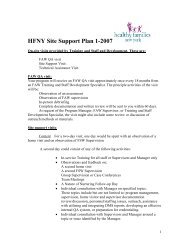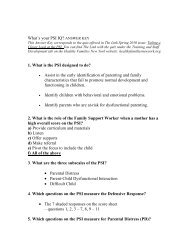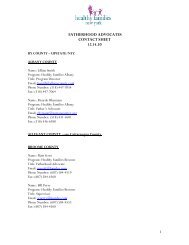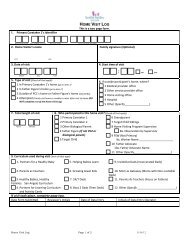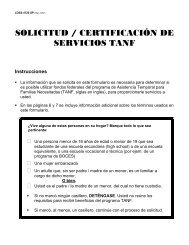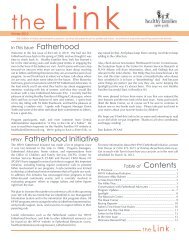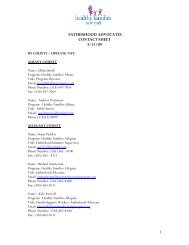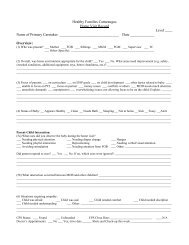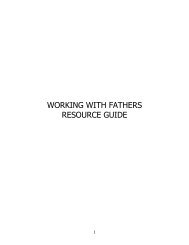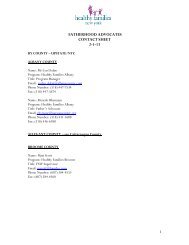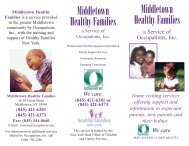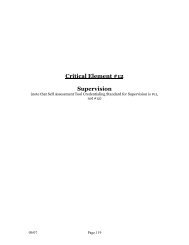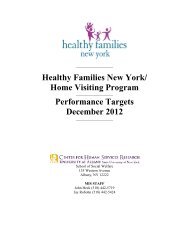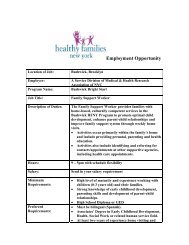HEALTHY FAMILIES NEW YORK
HEALTHY FAMILIES NEW YORK
HEALTHY FAMILIES NEW YORK
Create successful ePaper yourself
Turn your PDF publications into a flip-book with our unique Google optimized e-Paper software.
WELCOME TO<br />
<strong>HEALTHY</strong> <strong>FAMILIES</strong> <strong>NEW</strong> <strong>YORK</strong><br />
Multi Site Policies<br />
09/07 Page 7
Subject<br />
Policy<br />
HFNY POLICY AND PROCEDURE MANUAL<br />
HFNY Statement of Purpose<br />
Multi-Site Reference A-2<br />
Effective date July 2003<br />
Revised date(s) June 2007<br />
Appendices<br />
n/a<br />
Rationale:<br />
Healthy Families New York will have a written<br />
statement of purpose to guide the administration of<br />
services.<br />
Healthy Families New York has a written statement of purpose that guides the<br />
administration of its services. It reflects the goals and criteria contained in the<br />
HFA Critical Elements and the needs of children and families in the broader<br />
community.<br />
Procedures:<br />
<br />
<br />
<br />
The statement of purpose is reviewed every 4 years.<br />
Central Administration, the program sites and the Home Visiting Council<br />
provide input into the review of the Statement of Purpose.<br />
See attached Statement of Purpose<br />
09/07 Page 8
Healthy Families New York Statement of Purpose (Mission)<br />
The mission of Healthy Families New York is to improve child and family<br />
outcomes for the state’s at-risk families by providing supportive home visiting to<br />
new and expectant families.<br />
Program Goals:<br />
Support parent child bonding and relationships<br />
Promote optimal child and family health, development and safety<br />
Enhance parental self-sufficiency<br />
Prevent child abuse and neglect<br />
Effective: June 2007<br />
09/07 Page 9
Overview of Healthy Families New York<br />
Healthy Families New York (HFNY) is a voluntary home visiting program for<br />
expectant and new parents.<br />
Healthy Families New York offers home visiting services to expectant families<br />
and new parents, beginning prenatally or shortly after the birth of the child. The<br />
program identifies which families could most benefit from home visits by means<br />
of systematic screening and assessment in designated, high risk communities.<br />
Families who participate in the program are offered long-term in-home services<br />
until the child is in school or Head Start.<br />
The Goals of Healthy Families New York are to:<br />
<br />
<br />
<br />
<br />
Support positive parent-child bonding<br />
Promote optimal child health and development<br />
Enhance parental self-sufficiency<br />
Prevent child abuse and neglect<br />
The Healthy Families New York Program is a comprehensive prevention program<br />
that focuses on the safety of children while at the same time supporting families.<br />
The services are easily accessible to isolated, at risk families and are respectful of<br />
cultural and community diversity.<br />
In 2000, a law was passed by the New York State Legislature making home<br />
visiting in New York permanent.<br />
HFNY is affiliated with Healthy Families America, a national initiative of Prevent<br />
Child Abuse America.<br />
Statewide Program Management<br />
Healthy Families New York (HFNY) is funded and managed by the New York<br />
State Office of Children and Family Services (OCFS). OCFS contracts with all<br />
funded programs to provide Healthy Families services. Each funded site was<br />
selected through a competitive Request for Proposal process. The RFP solicited<br />
proposals from agencies serving very high need areas. In addition to the strength<br />
of the proposal, funded programs were able to document the need in their target<br />
area as well as strong community collaboration. Funded programs are required<br />
to follow the Healthy Families standards and participate in the credentialing<br />
process. These requirements are included in every contract between OCFS and<br />
Healthy Families sites. It is possible for HFNY programs to operate a program<br />
with local funding. These programs may be affiliated with HFNY provided they<br />
follow HFNY policies and standards.<br />
09/07 Page 10
OCFS currently has a Program Coordinator and Program Contract Managers who<br />
manage the program and provide technical assistance and monitoring of funded<br />
programs.<br />
OCFS contracts with Prevent Child Abuse New York (PCANY) to conduct all basic<br />
training, advanced training on selected topics, and through our statewide<br />
Continuous Quality Improvement efforts, to visit each site on a regular basis to<br />
observe home visits, assessments and supervision, provide a variety of site<br />
support activities geared to the needs and requests of each program, and provide<br />
technical assistance visits as needed. PCANY also manages a resource center for<br />
funded programs and communities interested in starting a Healthy Families<br />
program. They publish a quarterly newsletter. PCANY has a Director of Training<br />
and several HFA certified trainers.<br />
OCFS contracts with the Center for Human Services Research (CHSR),<br />
Rockefeller College of the State University of New York at Albany to manage the<br />
data system for the program and to conduct the evaluation of the program. A<br />
computerized management information system (MIS) is used to collect<br />
comprehensive, yet anonymous, information for managing the program and for<br />
evaluating the outcomes. With the CHSR, OCFS is conducting a random<br />
assignment study of the program to determine families’ characteristics, details of<br />
service delivery, and outcomes for the child and family. CHSR has a Director of<br />
Management Information and management information and evaluation staff.<br />
A Home Visiting Council comprised of representatives from state agencies<br />
serving children and families, funded programs, and child advocacy<br />
organizations from across the state provides guidance to the program. PCANY<br />
co-chairs the Council with OCFS.<br />
A number of measures are utilized to ensure program quality so that families<br />
receive effective and helpful services. They include:<br />
<br />
<br />
<br />
Regular, consistent supervision, support and training for all staff.<br />
Comprehensive training provided to all staff based on staff training needs<br />
Statewide leadership meetings consisting of all program managers and the<br />
members of Central Administration occur at least 3 times a year. The goals of<br />
these meetings include sharing resources, discussing training, multi-site<br />
policies, evaluation, technical assistance and quality assurance. Bimonthly<br />
meetings of all Program Managers have been held since the program began in<br />
1995. These meetings have been used to develop and relay policies and share<br />
ideas, successes, and concerns. At least 3 times a year (sometimes more in<br />
certain regions) program managers and regional representatives from Central<br />
Administration also meet. These meetings serve the same function as the<br />
larger meetings, but can address more regional concerns in a smaller group<br />
setting.<br />
09/07 Page 11
Technical assistance to sites and communities interested in starting a HFNY<br />
program, and those with a new program manager or experiencing some other<br />
type of transition.<br />
A structured system of mentoring new sites by experienced sites.<br />
A comprehensive Management Information System that collects information<br />
on all participants.<br />
Regular review of data submitted by funded programs.<br />
Standard performance targets that the programs report on that are related to<br />
the goals of the program.<br />
An ongoing evaluation of the program that includes a random assignment<br />
study at 3 sites.<br />
Regular on-site visits of funded programs by OCFS Program Contract<br />
Managers.<br />
A comprehensive quality assurance system based on HFNY policies that each<br />
site implements supplemented by regular and routine statewide quality<br />
assurance visits to each program by the HFNY training and staff development<br />
team.<br />
09/07 Page 12
CORE COMPONENTS OF THE <strong>HEALTHY</strong> <strong>FAMILIES</strong> <strong>NEW</strong> <strong>YORK</strong><br />
PROGRAM<br />
<br />
<br />
<br />
<br />
<br />
<br />
<br />
<br />
<br />
Universal screening by means of a standard record screening tool of all<br />
pregnant women and new parents in certain designated areas.<br />
Families with a positive record screen are offered an assessment. The Kempe<br />
Family Stress Checklist is the standardized risk assessment tool administered.<br />
The purpose of the tool is to identify the parents’ past and current behaviors,<br />
beliefs, experiences and expectations that place them at risk of child abuse<br />
and neglect. Through the administration of the Kempe, the family’s strengths<br />
– successes, abilities, hopes, dreams and fond memories – are identified as<br />
well as their challenges and needs. Based on information gathered through<br />
the assessment and the Kempe score, the family is linked to referrals and<br />
resources in the community, one of which may be intensive home visiting<br />
services through the HFNY program.<br />
Creative, persistent outreach approaches to isolated and hard to reach<br />
families, including those not receiving prenatal care.<br />
Home visiting services offered on a voluntary basis to families with a Kempe<br />
score of 25 or greater, ideally offered in the early prenatal period, or right<br />
after the birth of the child and continuing until the child is enrolled in school<br />
or Head Start.<br />
Intensive long term home visiting services by trained and caring home visitors<br />
called Family Support Workers. Visits occur weekly to biweekly during<br />
pregnancy and weekly during at least the first 6 months of the child’s life with<br />
intensity decreasing thereafter based on family need.<br />
Family centered services, recognizing that the adults in the family are the<br />
primary decision-makers, not program staff.<br />
Home visitors representing the language, culture and community of the<br />
families served.<br />
Supervision by health or social work professionals, or by experienced Healthy<br />
Families staff who meet specific criteria.<br />
Home visiting services that focus primarily on parent-child interaction, child<br />
development, parent support, and family functioning, including identifying<br />
and addressing self-sufficiency goals. The home visitors work with families to<br />
identify goals that build on family strengths, and facilitate referrals to any<br />
services the family may need including housing services, economic support,<br />
day care, GED programs, employment and training programs, or family<br />
resource centers.<br />
09/07 Page 13
Periodic developmental screening and referral for Early Intervention Services<br />
if a developmental concern is identified.<br />
Connection of the family with medical providers to ensure that the mother<br />
receives proper prenatal care, the child receives regular well baby care and<br />
immunizations, and the rest of the family receives primary health care<br />
services.<br />
Manageable home visitor caseloads, beginning with a maximum of 15 families<br />
and increasing to a maximum of 25 based on the mix of families at different<br />
service delivery levels.<br />
Formalized community collaboration, which helps to ensure that families<br />
receive the services they need and that services are not duplicative.<br />
SUMMARY<br />
The Healthy Families New York Program is a comprehensive prevention<br />
program that focuses on the safety and healthy development of children while at<br />
the same time preserving and supporting families. The services are easily<br />
accessible to isolated at risk families and are respectful of cultural and<br />
community diversity. The services come at a time in a family’s life when few<br />
other services are available and infants are most vulnerable. It is also the time<br />
when planned early intervention makes the greatest impact. Healthy Families<br />
New York is a comprehensive approach to meeting the health and social needs of<br />
New York’s newest and most vulnerable citizens, its children.<br />
09/07 Page 14
THE <strong>HEALTHY</strong> <strong>FAMILIES</strong> AMERICA APPROACH<br />
The Healthy Families New York (HFNY) Program is part of the nation-wide<br />
Healthy Families America (HFA) initiative. All program services are planned and<br />
delivered in accordance with the Healthy Families America program model.<br />
The following policies, guidelines and procedures are, in general, organized to<br />
reflect the critical elements for effective home visiting services. To operate a<br />
successful site, each program supplements this manual with Healthy Families<br />
America and HFNY training materials for Program Managers, Supervisors,<br />
Family Support Workers, and Family Assessment Workers.<br />
Each program site develops its own site specific policies and procedures, i.e.,<br />
more detailed and agency and community-specific, provided that the site’s<br />
policies and procedures are not in conflict with those of HFNY, or in conflict with<br />
the critical elements that define the Healthy Families America model.<br />
09/07 Page 15
<strong>HEALTHY</strong> <strong>FAMILIES</strong> <strong>NEW</strong> <strong>YORK</strong><br />
MULTI-SITE SYSTEM<br />
Healthy Families New York is a collaboration of state, local, private, and publicly<br />
–funded primary prevention home visiting programs affiliated with each other<br />
and with Healthy Families America (HFA). See Attachment “Multi Site System<br />
Flow Chart.”<br />
The partners in the multi-site system are:<br />
<br />
<br />
<br />
<br />
<br />
New York State Office of Children and Family Services (OCFS)<br />
Credentialed or “Affiliated” Healthy Families Programs in New York State<br />
Prevent Child Abuse New York (PCANY) - Training and Staff Development<br />
Center for Human Services Research, SUNY Albany- Evaluation & Data<br />
Management<br />
Healthy Families New York Home Visiting Council<br />
Other partners or participants may include representatives of additional funding<br />
sources, and new and developing programs.<br />
The Home Visiting Council functions as the Statewide Advisory Group (as per<br />
credentialing requirements).<br />
State and Regional Leadership meetings<br />
Statewide leadership meetings consisting of all program managers and the<br />
members of Central Administration occur at least 3 times a year. The goals of<br />
these meetings include sharing resources and information, and discussing and<br />
making decisions concerning training, multi-site policies, evaluation, technical<br />
assistance and quality assurance. They are also used share ideas, successes, and<br />
concerns. At least 3 times a year (sometimes more in certain regions) program<br />
managers and regional representatives from Central Administration also meet.<br />
These meetings serve a similar function as the larger meetings, but can address<br />
more regional concerns in a smaller group setting.<br />
PURPOSE<br />
The purpose of the multi-site system is to provide support and services to bring<br />
high quality services to the new and expectant parents and their children served<br />
by participating programs.<br />
The multi-site system provides, at a minimum:<br />
<br />
<br />
Support to new and developing programs<br />
Data collection and analysis<br />
09/07 Page 16
Staff training and professional development opportunities<br />
Informational and networking support<br />
Assistance with HFA credentialing<br />
Access to educational resources<br />
Quality assurance<br />
Technical Assistance<br />
Monitoring<br />
09/07 Page 17
HFNY POLICY AND PROCEDURE MANUAL<br />
Subject<br />
Affiliation<br />
Policy<br />
All HFNY programs will achieve and maintain<br />
affiliated status within the Multi-Site system.<br />
Multi-Site Reference Multi-site M-4, M5<br />
Effective date July 2001<br />
Revised date(s) July 2003, June 2007<br />
Appendices<br />
n/a<br />
Rationale:<br />
To ensure all HFNY programs understand the expectations for achieving and<br />
maintaining affiliated status within the Multi-Site system.<br />
Procedures:<br />
1. All programs affiliated with the multi-site system agree to the following:<br />
a. Compliance with the Healthy Families America Critical Elements for<br />
providing quality home visiting services and guidelines included in the<br />
Healthy Families New York Policy Manual.<br />
b. Provision of Home Visiting Services in a specified target area including<br />
universal screening in collaboration with relevant community service<br />
providers.<br />
c. Coordination with local health and social service departments.<br />
d. Compliance with prescribed performance targets.<br />
e. Participation in State and Regional Leadership meetings.<br />
f. Participation in the home visiting Management Information System and<br />
ongoing evaluation conducted by OCFS with CHSR;<br />
g. Participation in all required core, wrap-around and advanced training.<br />
h. Agreement to be credentialed by Healthy Families America. Upon<br />
funding, new programs are required to apply for HFA affiliation as part<br />
of the HFNY multi-site system. Programs will submit a copy of their<br />
affiliation letter with HFA to OCFS, maintain their affiliation status, and<br />
pay their affiliation fee as determined by HFA.<br />
i. Programs in the planning stages may also participate in the multi-site<br />
system provided a letter of intent to affiliate with HFA is filed within two<br />
months of the initiation of services to families. Programs not funded<br />
may phase in implementation of the Management Information System.<br />
j. Programs agree to annual updating of affiliation and fees with Healthy<br />
Families America.<br />
2. Revoking Affiliation<br />
a. Healthy Families New York affiliated programs will have their affiliation<br />
revoked if they fail to comply with the policies of HFNY after being<br />
informed of noncompliance in writing and after being given a period of<br />
09/07 Page 18
time not to exceed 6 months to make necessary revisions to practices or<br />
policies.<br />
b. Programs having their affiliation revoked will be notified in writing and<br />
given 30 days to respond to complaints. If programs submit an<br />
acceptable corrective action plan for remedying areas of noncompliance,<br />
they will be given up to 6 months to correct the situation, at which time<br />
the program will be reviewed for compliance.<br />
c. If the program has made acceptable progress, the affiliation will be<br />
continued. If the program does not make satisfactory progress, the<br />
affiliation will be immediately revoked.<br />
d. Termination of funded program’s contracts will be handled as a separate<br />
process according to the requirements specified in the OCFS contracts.<br />
3. Resolving Conflicts<br />
a. If a conflict arises, the parties involved with the conflict should each develop a<br />
clear written statement of the issue under discussion. Each party should<br />
make recommendations for resolution of the issue.<br />
b. A plan will be developed by the Central Administration team in consultation<br />
with parties involved that includes a time frame for resolution, provision of<br />
technical assistance to parties involved if applicable, and steps needed to<br />
resolve the conflict. If necessary, a neutral facilitator will be identified to<br />
assist with conflict resolution.<br />
c. If either party is dissatisfied with the resolution of the conflict, they can<br />
appeal the decision by requesting a review in writing. The review will be<br />
conducted by the supervisor of the HFNY Coordinator, OCFS.<br />
d. Once the review is made, the final decision will be relayed to all parties in<br />
writing.<br />
09/07 Page 19
HFNY POLICY AND PROCEDURE MANUAL<br />
Subject<br />
HFNY Home Visiting Council<br />
Policy<br />
HFNY will maintain a council that serves in an<br />
advisory capacity in the planning and coordination<br />
of program services and system activities.<br />
Multi-Site Reference Multi-site A-1, A-3<br />
Site specific reference no<br />
Effective date July 2001<br />
Revised date(s) June 2007<br />
Appendices<br />
N/A<br />
Rationale:<br />
The HFNY Home Visiting Council acts in an advisory capacity to the HFNY<br />
Program. It provides input into planning, policy, and advocacy for the HFNY<br />
initiative, including the development of the Strategic Plan for HFNY. The<br />
strategic plan guides its activities and is reviewed periodically.<br />
<strong>HEALTHY</strong> <strong>FAMILIES</strong> <strong>NEW</strong> <strong>YORK</strong> HOME VISITING COUNCIL:<br />
DEFINITION<br />
<br />
The Council’s purpose is to support and advance the Healthy Families New<br />
York Home Visiting (HFNY) Program and its statewide system. The Council<br />
exists in accordance with Healthy Families America credentialing standards.<br />
<br />
<br />
Council Members are persons from the public and private sectors who<br />
support the goals and purpose of the HFNY Program, including state and<br />
federal agencies serving children, the governor’s office, children’s advocacy<br />
groups, legislators’ offices, HFNY program sites, other early childhood service<br />
providers, health and family service professional associations and may<br />
include other supporters and parents served by the program,. Members also<br />
include HFNY Central Administration, staff from NYS Office of Children and<br />
Family Services, Prevent Child Abuse New York, and SUNY Center for Human<br />
Services Research.<br />
The HFNY Home Visiting Council is co-chaired by Prevent Child<br />
Abuse New York and NYS Office of Children & Family Services<br />
The co-chairs represents the public-private partnership that established and<br />
continues to support and promote the statewide program, one bearing primary<br />
responsibility for administration, management, and quality of HFNY Home<br />
Visiting, the other providing leadership in advocacy and education on behalf of<br />
the program.<br />
09/07 Page 20
The HFNY Home Visiting Council is responsible for developing and<br />
implementing a strategic plan.<br />
The Council meets on at least a biannual basis.<br />
The Council provides input to the review of the Statement of Purpose (see HFNY<br />
Statement of Purpose.)<br />
09/07 Page 21
HFNY POLICY AND PROCEDURE MANUAL<br />
Subject<br />
Development and Revision of HFNY Policies<br />
and Procedures<br />
Policy<br />
Programs use this multi-site manual and develop<br />
their own site-specific manual as a guide in the<br />
provision of services.<br />
Multi-Site Reference M-1, M-2, M-6<br />
Site-specific reference 10-2A, GA-8<br />
Effective date July 2003<br />
Revised date(s) June 2007<br />
Appendices<br />
-Request to Add/Revise HFNY Policies and<br />
Procedures<br />
-Policy Manual Review Tool.<br />
Rationale:<br />
To establish a system for the creation, distribution, and regular review of the<br />
Healthy Families New York Policy and Procedures Manual. To ensure that there<br />
is a system for updating and revising policies and procedures. This is necessary to<br />
represent best practice approaches consistent with HFA critical elements and<br />
standards, address the needs of New York State’s diverse communities and<br />
populations, and reflect current program experiences and home visiting research.<br />
Procedures:<br />
1. The HFNY State Policy and Procedure manual is distributed in hard copy and<br />
in electronic form to all HFNY sites. It is on the HFNY website. Each site is<br />
required to keep at least one hard copy in an accessible location for all direct<br />
service staff.<br />
2. HFNY has formal and informal mechanisms for recommending new and<br />
revised policies. Formally, the form “Request to Add/Revise Healthy Families<br />
New York Policies and Procedures” may be used at any time to request a new<br />
policy or recommend a change. A policy question may also be raised at any<br />
time during the year by any party for discussion at the HFNY Leadership<br />
meetings by submitting it to the host entity as an agenda topic.<br />
3. On an informal and ongoing basis, the Leadership Team and Central<br />
Administration partners and program staff communicate on the effectiveness<br />
and relevance of policies and procedures. This occurs during Leadership<br />
Team Meetings, quality assurance, technical assistance, and annual<br />
monitoring visits. Any member of the Leadership Team can bring ideas and<br />
concerns regarding existing policies to the Central Administration or<br />
Leadership Team for discussion. There are, however, some policies that<br />
cannot be revised due to legislative or funding requirements.<br />
09/07 Page 22
4. All new program managers are oriented to the HFNY Policy and Procedures<br />
Manual during their New Program Manager Overview and the Site to Site<br />
Mentoring program.<br />
5. All HFNY policies are reviewed at least annually at a Statewide HFNY<br />
Leadership meeting to determine if any changes are warranted. New and<br />
revised policies are mailed to all sites and Central Administration partners<br />
who then have 10 days to provide any changes or feedback. After 10 days, the<br />
policies are included in the official version of the HFNY Policy Manual. The<br />
official version and any recent changes are posted on the HFNY website.<br />
6. Each site develops its own policy and procedure manual that is consistent<br />
with HFNY and HFA policies, and incorporates the items specified in the<br />
Policy Manual Review Checklist. OCFS Program Contract Managers review<br />
each new site’s policy manual after one year of operation and provide written<br />
feedback. Sites have 90 days to make recommended changes to their manual.<br />
After the initial start-up period, sites share any policy changes with OCFS<br />
Program Contract Managers at annual site visits for their review and<br />
approval. This is reflected in the report sent to the program after the visit by<br />
OCFS.<br />
7. All staff must be oriented to their policies and procedures before contact with<br />
families as per Standard 10-2A.<br />
8. The manual is reviewed and consulted throughout the year with Central<br />
Administration partners and program staff as situations may require.<br />
09/07 Page 23
GENERAL POLICIES FOR STAFF<br />
The following are some general policies for staff of Healthy Families<br />
New York programs. Programs are required to develop policies<br />
around these topics more fully and with specifics to their own sites<br />
and communities.<br />
Scheduled Work Hours<br />
Family support programming requires flexibility. Each site determines its<br />
normal hours of operation. It is expected that programs will adopt flexible<br />
schedules, e.g., evenings and weekends in order to meet the needs of working<br />
families. (Overtime pay is not provided through the HFNY grant.)<br />
Any changes in scheduled appointments, or calling in sick, are communicated to<br />
the immediate supervisor. Supervisors need to know where and when FAWs and<br />
FSWs are conducting visits each day. It is recommended that staff who are in the<br />
field call the office to speak with their supervisor and check on messages. If staff<br />
start their day before coming to the office or end their day without coming to the<br />
office, it is recommended that they call the office and speak with a supervisor.<br />
Punctuality<br />
Staff members are expected to schedule visits in a timely manner and to be on<br />
time for scheduled visits.<br />
Staff Safety<br />
Safety of staff members is a program priority. Each program site must have<br />
established a policy on safety to guide staff in their work in the office, families’<br />
homes and the community. This includes protocols around signing-in and out,<br />
calling in throughout the day, and assuring supervisors know staff’s schedules.<br />
FSWs, FAWs, Supervisors, and Managers all share responsibility for maximizing<br />
safety of staff members. Staff members should never attempt to intervene in a<br />
domestic dispute. Program staff should leave if their safety is threatened for any<br />
reason and immediately contact a supervisor or manager.<br />
Boundaries<br />
Program staff receives initial orientation before their first home visit alone, and<br />
on-going support and training on maintaining effective boundaries between the<br />
personal and the professional. Feelings such as excessive worrying, ‘rescuing,”<br />
and over-identification should all be recognized by staff as issues where support<br />
is needed and to bring to the attention of the supervisor.<br />
09/07 Page 24
Accepting Gifts or Favors<br />
Programs develop policies to guide staff around accepting gifts. These state that<br />
staff will report to their supervisor any gifts given by participants and that they<br />
are unable to accept a gift of anything of significant value. Staff are encouraged to<br />
explain to the family that this is an agency policy and that they are not allowed to<br />
accept.<br />
Transportation Guidelines<br />
Each site determines its transportation guidelines. Out of state travel must be<br />
pre-approved by the OCFS Program Contract Manager. The following are<br />
examples of possible guidelines that may be used or adapted to best meet the<br />
administrative and fiscal tracking of the program and host organization.<br />
For Staff Utilizing Automobiles: A copy of staff's valid driver's license and<br />
registration and insurance cards of the vehicle used for work must be on file with<br />
the organization. Mileage to and from your home and the office is not<br />
reimbursable. Mileage sheets are to be turned in to supervisors on a weekly<br />
basis.<br />
For Staff Utilizing Mass Transit: Name, address and telephone numbers of the<br />
participants being visited are documented on the travel log sheet for token<br />
reimbursement.<br />
09/07 Page 25
HFNY POLICY AND PROCEDURE MANUAL<br />
Subject<br />
Technical Assistance, Quality Assurance and Site<br />
Support<br />
Policy<br />
Central Administration will monitor and evaluate<br />
the quality of services of all individual program<br />
sites. Program sites will be active participants in<br />
this process and receive technical assistance and<br />
site support based on identified goals and areas of<br />
improvement.<br />
Multi-Site Reference T-5<br />
Effective date July 2003<br />
Revised date(s) June 2007<br />
Appendices<br />
FAW Observation Form, FAW Supervision<br />
Observation Form, Content Review Form, FSW<br />
Home Visit Observation Form, FSW Supervision<br />
Observation Form, Site Support Plan protocol, Site<br />
Support Feedback Form, TA feedback Form, Site<br />
Visit Protocol<br />
Rationale:<br />
To ensure the quality of services of all HFNY programs is routinely monitored,<br />
evaluated, and supported through a system of continuous quality improvement.<br />
This policy ensures that HFNY has a formal mechanism for reviewing the quality<br />
of all aspects of the program, planning for and delivering technical assistance and<br />
site support based on identified goals and areas for improvement, and reviewing<br />
progress toward goals and objectives. The allocation of this assistance to sites is<br />
based upon the individual site-identified needs, information gathered about the<br />
site through the quality assurance system and information gathered about the<br />
site through training.<br />
TECHNICAL ASSISTANCE, QUALITY ASSURANCE, AND SITE<br />
SUPPORT<br />
It is paramount that HFNY programs maintain a high degree of quality. Toward<br />
this end, all HFNY programs receive technical assistance, quality assurance, and<br />
site support from the three branches of Central Administration (CA). These<br />
services are part of the HFNY system for continuous quality improvement.<br />
Quality assurance activities provide individual program sites with an outside<br />
perspective on staff competence and program performance. After program<br />
strengths and challenges are identified in this way, CA supports program<br />
improvements by providing training, technical assistance, and site support that<br />
directly addresses each individual program’s needs. Although all three branches<br />
of the Central Administration provide on-going assistance to programs through<br />
as needed phone calls and e-mail consultation, the following details the formal<br />
activities provided by each:<br />
09/07 Page 26
PCANY Training and Staff Development<br />
Trainings<br />
FAW QA visit<br />
Site Support Visit (includes the FSW QA visit)<br />
Technical Assistance Visit<br />
OCFS<br />
Training and Technical Assistance<br />
Annual Site Review<br />
Monitoring quarterly and annual reports<br />
CHSR<br />
Training and Technical Assistance<br />
Reports<br />
PCANY Training and Staff Development<br />
Trainings<br />
In addition to required trainings such as Core (Role Specific) Trainings, the<br />
PCANY Training and Staff Development team also provides on-going and<br />
advanced training and coordinates workshops, seminars and conferences at the<br />
regional and state levels, some of which can help to meet the wrap-around<br />
training requirements. HFNY Training and Staff Development and/or OCFS,<br />
conducts a needs assessment each year to programs in order to determine the<br />
need for trainings. Topics for advanced training, whether provided at the local,<br />
regional or state level, are selected based upon annual training surveys of staff<br />
needs and other feedback from staff, information obtained by Program Contract<br />
Managers during site visits, and information learned by Training and Staff<br />
Development about particular needs of sites. In addition, advanced training takes<br />
into account program goals and workers’ knowledge and skill base.<br />
FAW QA visit<br />
HFNY programs receive an FAW QA visit approximately once every 18 months<br />
from an FAW Training and Staff Development Specialist. The principle activities<br />
of the visit will be:<br />
<br />
<br />
<br />
Observation of an assessment<br />
Observation of FAW supervision<br />
In-person debriefing<br />
Complete documentation and written review that includes identified strengths<br />
and recommendations will be sent to Program Managers within 60 days of visit.<br />
At the request of the Program Manager, FAW Supervisor, or Training and Staff<br />
Development Specialist, the visit might also include some review or discussion of<br />
outreach methods or materials.<br />
09/07 Page 27
Site Support Visits<br />
The site support visit is a two-day visit that includes on one day, an Observation<br />
of Home Visit and an Observation of FSW Supervision. A second day is tailored<br />
to each program’s needs as identified in advance by the Program Manager, the<br />
Program Contract Manager, CHSR staff, and other members of Training and<br />
Staff Development. This day could consist of any of the following activities:<br />
<br />
<br />
<br />
<br />
<br />
In-service Training for all staff or Supervisors and Manager only<br />
Observations and feedback on the following:<br />
o A second home visit<br />
o A second FSW Supervision<br />
o Group Supervision or Case Conferences<br />
o Team Meetings<br />
A Nature of Nurturing Follow-up Day<br />
Individual consultation with Manager on specified topics, including but<br />
not limited to the following:<br />
o program management<br />
o supervision<br />
o home visitor and supervisor documentation review/discussion<br />
o personnel/staffing issues<br />
o outreach<br />
o assistance with utilizing and integrating MIS reports<br />
o developing an effective internal QA system<br />
o preparation for credentialing<br />
Individual consultation with Supervisors and Manager around a topic or<br />
issue identified by the Manager.<br />
HFNY programs receive a Site Support Visit approximately once every 18 months<br />
from a PCANY Training and Staff Development Specialist. Allocation and<br />
content of site support visits is based upon individual sites’ needs and requests,<br />
information learned about the site through the quality assurance system, on<br />
information learned about the site through training events, and on the dates of<br />
other on-site assistance provided by PCANY. Prior to a site support visit, the<br />
Staff Development person assigned to the site by the Director of Training and<br />
Staff Development will contact the Program Contract Manager, review the data<br />
reports for the last 2 quarters, contact CHSR staff, and contact the Program<br />
Manager in order to identify program concerns and goals and determine if there<br />
are any special requests for the visit. Following the initial information-sharing<br />
and planning discussion, the Staff Development person will draft a plan for the<br />
visit and send it to all parties for review. The plan that is developed may require<br />
assistance from someone other than a Staff Development Specialist, and in that<br />
case, Central Administration partners will attempt to come up with a plan to<br />
meet this need. Providing no requests are made for amendment, the visit will<br />
proceed according to the plan.<br />
09/07 Page 28
After the visit is conducted, programs have a formal opportunity to provide<br />
feedback on the usefulness and helpfulness of both the process and the report. A<br />
brief written evaluation should be mailed from the program to the Director of<br />
Training and Staff Development. Complete documentation and written review<br />
will be submitted to OCFS as well as the program. It includes identified strengths<br />
and recommendations and is sent to Program Managers within 60 days of visit.<br />
This documentation includes the Observation of Home Visit and Observation of<br />
FSW Supervision as well as the following:<br />
<br />
<br />
<br />
<br />
<br />
The process and individuals that were part of the planning phase,<br />
The goals for the Site Support Visit,<br />
The individuals and activities that comprised the Site Support Visit,<br />
A follow-up plan, if required, and<br />
The Program Manager’s evaluation of the process.<br />
After Program Managers have an opportunity to review the report, the staff<br />
development specialist will call again to answer questions and provide any<br />
additional follow-up.<br />
TA Visits<br />
A Technical Assistance (TA) Visit is typically a two-day on-site visit with a third<br />
day of follow-up either on-site or via phone calls and e-mail. These visits are<br />
made at the request of a program’s Program Contract Manager. Situations that<br />
might lead to a TA request include the following:<br />
<br />
<br />
<br />
a change in program management/host agency,<br />
on-going challenges meeting performance standards<br />
new or recently expanded program<br />
Prior to the visit, the Program Contract Manager will discuss the need for on-site<br />
TA and clearly identify his/her concerns with the Program Manager and Staff<br />
Development Specialist. The Staff Development Specialist may request specific<br />
documents, such as the most recent site visit reports and data reports specific to<br />
any identified challenges, to support the development of the plan for the TA visit.<br />
Each plan is tailored to individual program needs, so it is not possible to describe<br />
specific activities here. Once the draft plan for the visit is developed, it is shared<br />
with the Program Manager and the Program Contract Manager for approval.<br />
Based on the identified needs of the site, the Program Contract Manager and/or a<br />
representative from CHSR will also accompany the PCANY staff person for a<br />
portion of the visit.<br />
An Action Plan, which may or may not be a formal Corrective Action Plan, is<br />
developed as a result of the visit. The responsibility for implementation and<br />
monitoring of the plan is held by the Program Contract Manager and the<br />
Program Site/ Program Manager and does not involve PCANY; however, PCANY<br />
09/07 Page 29
may supply some follow-up assistance, such as an additional day on site, or email<br />
and phone consultation. Decisions about follow-up assistance are made on a<br />
program-by-program basis and determined by the Program Manager, the<br />
Program Contract Manager, and Training and Staff Development.<br />
After the visit has been conducted, a written review along with complete<br />
documentation of the visit is sent to the Program Manager within 60 days.<br />
Follow-up documentation includes a description of the goals, the activities that<br />
occurred during the planning phase, and the activities that occurred during the<br />
actual visit. Follow-up phone consultation is generally planned for a specific<br />
date.<br />
After the visit is conducted, programs have a formal opportunity to provide<br />
feedback on the usefulness and helpfulness of both the process and the report<br />
using the TA feedback form. It is mailed from the program to the Director of<br />
Training and Staff Development and the Program Contract Manager.<br />
OCFS<br />
Training and Technical Assistance<br />
OCFS staff provide on-site training and technical assistance for individual<br />
programs. Program Managers should contact their Program Contract Manager to<br />
make a request.<br />
Annual Site Review<br />
As part of their contracts, HFNY programs receive at least one two-day Site<br />
Review each program year. This review is conducted by the Program Contract<br />
Manager, who schedules the visit with the Program Manager at least one month<br />
prior to the Site Review. The Site Review is tailored for each program and<br />
typically includes topics in which the program manager self-identifies as needing<br />
assistance, issues that have been identified in any of the program’s reports, and<br />
any other concerns the program contract manager may have. In addition, the<br />
Program Contract Manager will review a group of credentialing standards from<br />
the program’s self-assessment during the visit. A Site Review may include a<br />
review of the following program elements:<br />
<br />
<br />
<br />
<br />
<br />
<br />
<br />
<br />
<br />
Universal Screening<br />
Referral Process<br />
Community Relations<br />
Staffing<br />
Supervision<br />
Annual Service Review<br />
Self-Assessment<br />
Policies and Procedures<br />
Quality Assurance<br />
09/07 Page 30
Training<br />
Staff Meetings<br />
Fiscal Issues<br />
Documentation<br />
At the end of the visit, the Program Contract Manager and Program Manager may<br />
discuss appropriate follow-up activities for reaching program goals. After the<br />
visit, the program contract manager will send the program manager a letter that<br />
includes a summary of findings and will request a response and/or corrective<br />
action plan for items noted in the findings.<br />
OCFS also helps coordinate Bi-monthly Leadership Team Meetings and a Bi-<br />
Annual All Staff Training Seminar.<br />
CHSR<br />
Training and Technical Assistance<br />
CHSR staff provides on-site training and technical assistance for individual<br />
programs. Program Managers may contact their Program Contract Manager to<br />
make a request, or contact the center directly.<br />
Data Reports<br />
All HFNY programs are contractually obligated to submit data to CHSR monthly.<br />
CHSR uses this data to generate two types of reports: quarterly data reports, and<br />
semi-annual performance indicator reports. These reports include data on the<br />
individual program as well as aggregate data on the entire HFNY program. While<br />
the primary purpose for collecting and reporting this data is accountability and<br />
evaluation of the entire HFNY program, this information can also support<br />
individual program’s quality assurance and improvement efforts. Programs have<br />
the capacity to access all reports at their sites and can utilize them to (a) identify<br />
strengths, concerns and trends, and (b) develop quality improvement plans.<br />
09/07 Page 31



